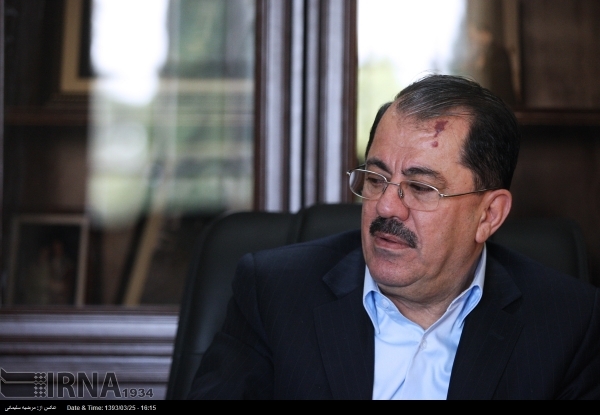TEHRAN – Describing Iran’s role in the fight against terrorism as “vital” and effective”, the Kurdistan Regional Government (KRG) representative in Tehran says that Major General Qassem Soleimani helped the Iraqi Kurdistan by sending weapons and military advisers to defeat Daesh, also called Daesh in its Arabic acronym.
“Martyr Qassem Soleimani not only helped in the framework of consultation but also in the battlefield,” Nazim Dabbagh tells the Tehran Times. “We are thankful and appreciative for Iran’s advisory presence and its arms aid to eliminate the Daesh threat from Erbil.”
The following is the text of the interview:
Q: How do you assess the role of Iran and General Qassem Soleimani in supporting the Iraqi Kurdish Region to confront Daesh? Kurdish leaders say that Qassem Soleimani provided weapons for Arbil when Daesh invaded Iraq.
A: As you mentioned, in fact, the officials of the Iraqi Kurdistan, including Mr. Massoud Barzani, have emphasized that Iran's role in the fight against terrorism in Iraq has been vital and important.
Martyr Qassem Soleimani did not only help in the framework of consultation, but also in the battlefield. He helped the Iraqi Kurdistan in its combat against terrorism. We are thankful and appreciative for Iran’s advisory presence and its arms aid to eliminate the Daesh threat from Erbil.
Q: Given the geopolitical situation in West Asia and the looming threats in the region, how do you assess Iran's role in stabilizing and combating terrorism?
A: Iran has a special position due to its geopolitical situation in the region, especially in the war against terrorism including Daesh. Tehran played an important role.
Indeed, the Islamic Republic of Iran has historically played this role, both during the 8-year war imposed by Saddam Hussein and in the midst of the war against Daesh. Iran has played a constructive role that has brought security and stability to the region.
I have said many times that if it were not for Iran, after the fall of Mosul, Daesh could have captured Baghdad as well as the Kurdistan region, but fortunately, the Islamic Republic and other allies made every effort to be helpful and effective which are commendable.
Q: Iran has been a victim of terrorism since the victory of the Islamic Revolution and has gained valuable experience in this regard. What are the significance and effect of efforts made by commanders such as Martyr Soleimani to contain the chaotic situation in the region?
A: Iran, especially after the victory of the Islamic Revolution and years of experience in fighting terrorism and confronting various enemies, could create a kind of solidarity and unity among people.
In one of Soleimani’s speeches, I heard him spoke about the role of martyrs and leadership in deterring enemies. In his view, the leadership plays a pivotal role in mobilizing the people to support the revolution and help it to continue and defeats its foes, because the people need leaders on the battlefield who are brave and wise, as Soleimani was. This experience made peoples of the region always ready to fight terrorism under the command of leaders such as Martyr Qassem Soleimani, and we have witnessed this fact.
Q: What characteristics did make General Soleimani popular in the region and make him attract people with different religions and views?
A: If we want to talk about the characteristics and personality of people like Qassem Soleimani, we must mention that he was a faithful person, honest, brave.
Until the day he was martyred, he believed in his cause and was proud of it. I remember one day some of his friends warned him about the U.S. attempts to assassinate him and called on him to be more careful. He laughed and said that we are made for martyrdom and we are waiting to see when we will be martyred. These characteristics were the reason for his popularity. He did not pursue personal interests or power, but rather fought for his goals and aspirations.
Q: Why did some Western states like the U.S put someone like Qassem Soleimani, who was fighting Daesh, on the list of terrorists?
A: Defining terrorism or attributing terrorism to a country or person, or accusing a country or person of supporting terrorism, is made based on the interests of countries. Western and European countries have one policy and Iran has another, but in general, I think the people are entitled to give a real definition.
When the people of Iran or Iraq are satisfied with their own governments, it makes the Western definition unreliable. It is the stance and approval of the people of a country that rejects or approves these definitions.
Q: How do you describe Qassem Soleimani's relations with Kurdish leaders and Kurdish groups or organizations?
A: My acquaintance with martyr General Qassem Soleimani dates back to 1991 after the uprising of the people of Kurdistan. Certainly, his politico-military position led to good relations with the officials, leaders, and political groups of the Kurdistan region.
These relations were to such an extent that when martyr Soleimani was seen with one of the Kurdish leaders, especially Mr. Talabani and Mr. Barzani, we did not feel distant, but we felt a sense of friendship and honesty.
https://www.tehrantimes.com/news/456510/KRG-rep-in-Tehran-says-Gen-Soleimani-helped-Kurdistan-to-fight
